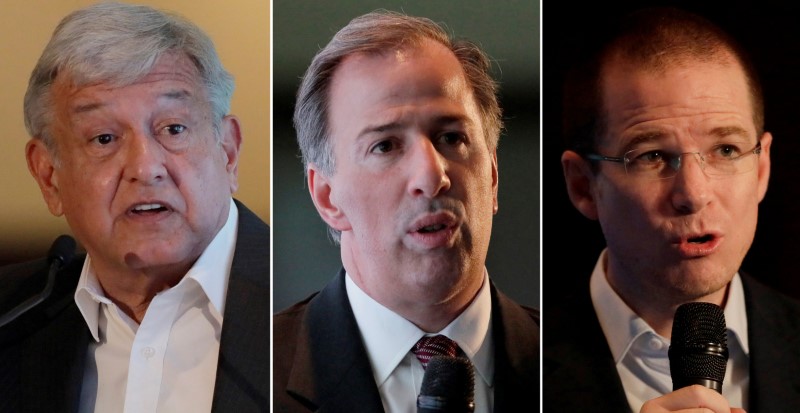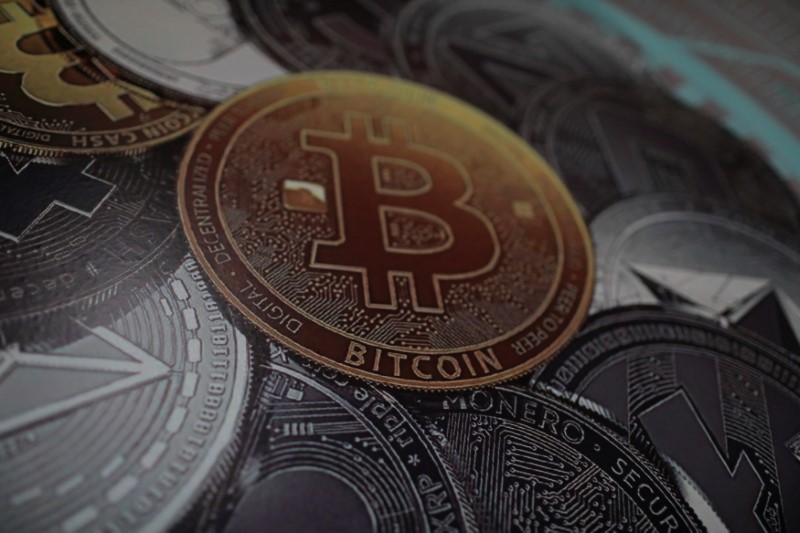
FILE PHOTO: A combination picture shows candidates (L to R) Leftist front-runner Andres Manuel Lopez Obrador of the National Regeneration Movement (MORENA), Institutional Revolutionary Party (PRI) presidential candidate Jose Antonio Meade and Ricardo Anaya, presidential candidate for the National Action Party (PAN), leading a left-right coalition, addressing the audience during a conference organised by the Mexican Construction Industry Association in Guadalajara, Mexico, March 23, 2018. REUTERS/Henry Romero/File Photo
June 29, 2018
By Christine Murray and Stefanie Eschenbacher
MEXICO CITY (Reuters) – Mexico’s three leading presidential candidates have not declared a single peso in direct private financial contributions to their election campaigns, federal records show, raising concerns from corruption watchdogs about the potential influence of dark money in a pivotal contest.
Candidates from Mexico’s three main political parties said they have relied almost exclusively on money from their parties, which is overwhelmingly public, to bankroll their campaigns, a total of more than 634 million pesos ($32.1 million).
That is according to the most recent declarations they have filed with the National Electoral Institute, known as INE.
Mexicans head to the polls on July 1 to elect their next president in what has been a highly anticipated and hard-fought contest. According to the candidates’ filings, not one of the country’s nearly 90 million registered voters made a monetary contribution directly to their campaigns, and just 70 people have given a total of around 1.4 million pesos ($70,897) of in-kind goods or services.
By law, Mexican parties must rely on public funding for the majority of their financing. Private donations are tightly regulated and have never played an important role in modern campaigns – at least not the modest sums typically declared to federal election authorities. In reality, large, clandestine contributions and illegal vote buying have factored into Mexican elections for decades, corruption watchdogs say.
The latest figures reported to INE strain credibility and underscore the difficulty of cleaning up Mexico’s campaign finance system, said Max Kaiser, an authority on anti-graft initiatives at the nonprofit Mexican Institute for Competitiveness.
“Until we stop this cycle, we won’t be able to control corruption in Mexico,” Kaiser said.
The presidential campaigns of Jose Antonio Meade, candidate of the ruling Institutional Revolutionary Party or PRI, and Ricardo Anaya of the National Action Party or PAN, both said their public funding was sufficient, so they did not need private money. Representatives for the two candidates said there has been no under-reporting of private donations or campaign spending.
A representative for the frontrunner, Andres Manuel Lopez Obrador, running for the MORENA Party, did not respond to a request for comment.
(Meet Mexico’s 2018 presidential candidates: https://tmsnrt.rs/2MVhfjA)
The federal election agency INE regulates campaign finance. INE board member Ciro Murayama said he found nothing unusual in the candidates’ declarations that they have not taken any private money.
“If someone doesn’t believe it, they have to demonstrate it,” Murayama said in an interview. “If someone thinks something, the burden of proof is on that person.”
But Luis Carlos Ugalde, a former president of INE, acknowledged that Mexico’s strict limits on private donations are easily evaded by contributors seeking influence.
“The campaign (spending) limits are not respected” Ugalde said. “Private donors prefer to give without reporting it to buy access.”
In Mexico’s 2012 federal elections, less than three percent of campaign financing came from private donors, according to a document on INE’s website.
In the current election cycle, presidential candidates affiliated with parties are allowed to spend up to 429.6 million pesos ($21.8 million) during the campaign.
The government tightened campaign finance laws in 2007 following a contentious presidential race. A 2014 reform aimed to improve transparency and toughen penalties, including giving INE the authority to annul the results of an election if the winner was found to have spent beyond the limits.
Still, doubts abound over the agency’s capacity to monitor illegal money. For every one peso declared in campaign spending, at least 15 pesos more go unreported, nonprofit Mexicanos Contra la Corruption estimated earlier this year.
In a poll released this week, more than a third of Mexicans surveyed said political parties had tried to buy their votes for a 2018 election, whether federal or local, according to the nonprofit Citizen’s Action Front Against Poverty.
A businessman linked to a massive corruption scandal involving Brazilian conglomerate Odebrecht SA testified in 2016 to Brazilian prosecutors that the construction giant had channeled millions of dollars to a senior campaign official of Enrique Pena Nieto, Mexico’s current president and a member of the PRI. Pena Nieto has repeatedly denied the allegations. Under Mexican law he is limited to a single, six-year term.
Mexico’s Attorney General said in 2017 that it would investigate the allegations. The probe is ongoing.
INE recently sanctioned an independent presidential candidate, Jaime Rodriguez, for financing irregularities. Rodriguez, who was fined 739,000 pesos ($37,423), denied wrongdoing and said the fine was unjust. He has raised 8.1 million pesos ($410,984) for his campaign, all through private contributions.
Marco Fernandez, a professor at the government school at the Tec de Monterrey university, said INE’s action showed it was becoming more sophisticated at rooting out campaign finance violations. But he said the generally small fines and lack of consequences for candidates with parties or their donors were not much of a deterrent.
“Unfortunately, so far, electoral lies are still very cheap,” Fernandez said.
($1 = 19.7088 Mexican pesos)
(Reporting by Christine Murray and Stefanie Eschenbacher; Additional reporting by Sheky Espejo and Lizbeth Diaz; Editing by Frank Jack Daniel and Marla Dickerson)

